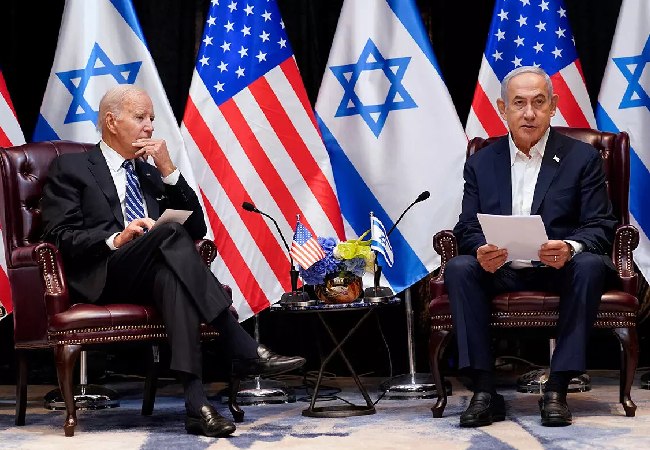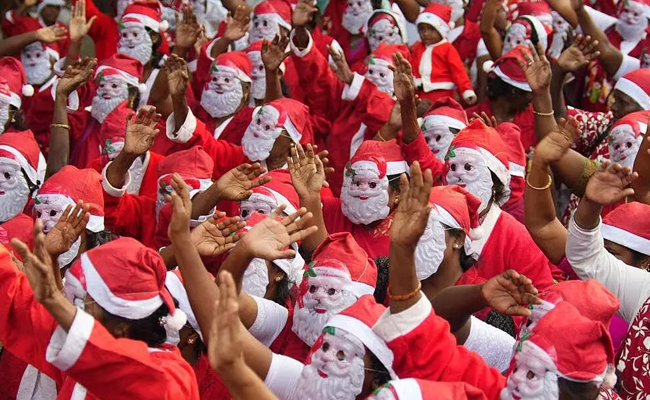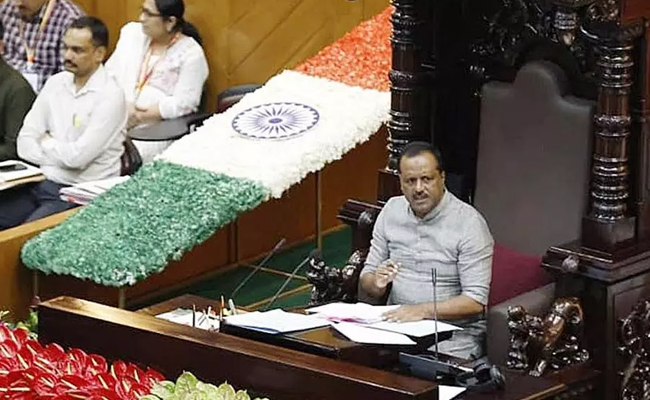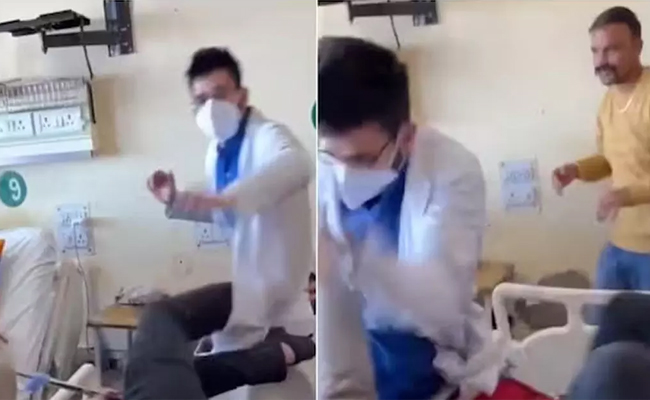Tel Aviv, (PTI): US President Joe Biden Wednesday said that based on what he saw, it appears that the deadly explosion at the Gaza hospital was done by "the other team" and not the Israeli military, accepting the Israeli version that a "misfired" rocket by the Palestinian militant group Islamic Jihad was responsible for the tragedy.
Biden said that he asked "tough questions" during a meeting with Israeli Prime Minister Benjamin Netanyahu. He also said that he supports a two-state solution so that Israel and the Palestinian people can both live safely and securely in peace and announced USD 100 million for humanitarian aid in the war-torn Gaza and the West Bank.
"I was deeply saddened and outraged by the explosion at the hospital in Gaza yesterday. Based on what I've seen, it appears it was done by the other team, and not you," he told Netanyahu, publicly endorsing Israeli contention.
He added that there were "a lot of people out there" who weren't sure what caused the explosion at Al-Ahli Baptist Hospital in the centre of Gaza.
Later in a post on X, Biden, who is here on a solidarity visit to express support for Israel amid the ongoing conflict with Hamas-led Palestinian factions, said he was "proud to be in Israel to honour the courage, commitment, and bravery of the Israeli people. Americans are grieving with you following last week's terror attacks."
Biden said he spoke with Prime Minister Netanyahu regarding the situation on the ground, security assistance and humanitarian needs, and information on unaccounted Americans. "I asked tough questions as a friend of Israel. We will continue to deter any actor wanting to widen this conflict," he said in another post.
The Palestinian Health Ministry has said that 471 people were killed and 314 others injured in the hospital blast for which Hamas and Israel traded charges holding each other responsible for the incident. Israel has blamed a misfired rocket from the Islamic Jihad, a claim rejected by the militant group.
When asked what made him confident Israelis weren't behind the hospital blast in Gaza City, Biden said he cited "the data I was shown by my defense department," CNN reported.
Meanwhile, White House National Security Council spokesperson Adrienne Watson said that a current intelligence assessment, based on analysis of "overhead imagery, intercepts and open source information", shows Israel was "not responsible" for the hospital blast.
Biden earlier said that he had directed his national security team to continue gathering information about what exactly happened at the hospital.
The hospital explosion derailed the diplomatic efforts as a summit between President Biden and Arab leaders in Jordan's Amman was cancelled.
During the meeting, Biden told Netanyahu that he is "here for a simple reason I want the people of Israel and the people of the world to know where the US stands".
Biden stressed that Hamas "slaughtered" its victims, including 33 Americans.
"They have committed evils and atrocities that make ISIS look somewhat more rational," he said, adding that "Hamas does not represent all the Palestinian people and has brought them only suffering".
Extending unflinching support for Israel, the American leader said that Washington will make sure that Israel has what it needs to defend itself.
"The world is looking," he said, asserting that "Israel has a value set like the US does and other democracies, and they're looking to see what we're going to do".
He also lauded the courage and commitment of the Israelis calling it "stunning."
Netanyahu thanked Biden for coming to Israel and for his unequivocal support, a "support that reflects the overwhelming will of the American people."
He said that Hamas' crimes included rape, burning, kidnapping, and targeting small children. The death toll in the brutal attack could be above 1400, the premier said.
Netanyahu said Hamas kidnapped women and children, elderly, Holocaust survivors. "I know you share our outrage on this. And I know you share our determination to bring these people back....On October 7, Hamas murdered 1,400 Israelis, maybe more", the premier said.
"This is in a country of fewer than 10 million people. This would be equivalent to over 50,000 Americans murdered in a single day. That's 20 times 9/11s. That is why October 7 is another day that will live in infamy," Netanyahu emphasised.
"Just as the civilized world united to defeat the Nazis, and united to defeat ISIS, the civilized world must unite to defeat Hamas," Netanyahu pleaded, stressing that Israel is united and Israel will defeat Hamas.
They also discussed the hostage situation as the US continues to work to get these hostages out, the White House said, adding that President Biden's top priority is the safe return of American hostages.
The Israeli leader expressed appreciation for America's commitment to Israel's security which he said was "truly unprecedented".
Pointing to the fact that Biden is the first ever US president to visit Israel in a time of war, Netanyahu called it "deeply, deeply moving."
"It speaks to the depth of your personal commitment to Israel. It speaks to the depth of your personal commitment to the future of the Jewish people and the one and only Jewish state," he noted.
After meeting with President Biden, Netanyahu agreed to allow the shipment of humanitarian assistance from Egypt to Gaza.
Biden also met with first responders and the families of victims of Hamas' attack on Israel before leaving the country in the evening.
Since the start of hostilities on October 7, as many as 3,478 Palestinians have been killed and 12,065 others injured, according to a spokesman of the Ministry of Health in Gaza.
Let the Truth be known. If you read VB and like VB, please be a VB Supporter and Help us deliver the Truth to one and all.
Palakkad: A group of children celebrating Christmas through a carol roadshow was allegedly attacked by BJP workers in Kerala’s Palakkad district on Sunday night.
According to local reports, the incident occurred in Pudussery area of Palakkad, where over 25 children, mostly aged around 13, were moving from house to house singing Christmas carols. Reports state that a BJP worker identified as Ashwin Raj, along with others, allegedly assaulted the children and vandalised their musical equipment.
According to the police and eyewitness accounts, the children were using a band set that belonged to a local CPI(M) office, which had the party’s name written on it.
Allegedly objecting to this, the accused and his associates reportedly lured the children on the pretext of offering them money and then assaulted them. The band set used by the children was also smashed.
ALSO READ: Punjab: Duped of Rs 8 crore in cyber fraud, ex-IPS officer Amar Chahal shoots self in Patiala
The Town Police have arrested Ashwin Raj, a local BJP worker who has been named as the prime accused in the case. Efforts are underway to trace and arrest the remaining accused who fled the scene.
Speaking to the media, one of the injured children said, “We were using the band just for fun. When they saw that it had CPM written on it, they took us aside and beat us.”
"We had given the band set that was in our office out of love when the children asked for it. The fact that these young children, who do not know the intricacies of politics, were attacked shows the criminal mentality of the BJP workers," local CPIM leaders expressed outrage.
A police officer told PTI that the arrested accused is already booked under the Kerala Anti-Social Activities (Prevention) Act (KAAPA).
The sections invoked include Section 192 (provocation with intent to cause a riot), Section 115(2) (voluntarily causing hurt), and Section 110 (attempt to commit culpable homicide), police added.





